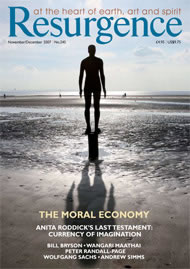IN 2003 Carlo Petrini stunned a meeting of the Commission on the Future of Food, who were preparing to lobby the World Trade Organization (WTO). He said that pleasure “is a human right” and that food is a basic physiological pleasure – every time we eat we experience pleasure!
And this is what is unique about this book. Yes, it does deal with all the terrible ecological, environmental, political and industrial threats that face the production of good sustainable food, but it also touches something much more fundamental to us all – the experience of food in its fullest sense.
The Slow Food Movement is the only organisation that talks about food first. My concern with the organic movement is its focus on farming and processing rather than the result – food. Unfortunately organics is being industrialised – fast becoming big business; certification is about money and more regulation. This produces a ‘tyranny’ that excludes small growers who cannot afford it, not just in this country but worldwide.
There is a small Kenyan grower situated close to a large international hotel. The grower is organic but cannot afford certification. So the hotel sources from South Africa. This goes on the world over – organics is a ‘barrier to trade’, as the WTO would say. And yet the WTO will do nothing to help – its interest is with large-scale, ‘efficient’ farmers who export and often leave their own communities short of food or, worse still, starving.
So Slow Food has a real and increasingly pressing mission to protect our food culture and the small producers who have created and brought such riches to us over the centuries. Petrini writes eloquently about this and its importance today – it is not just the extinction of wild species, but the extinction of our diverse food cultures that is at stake.
In the end it is only our love of food that will defend biodiversity and our traditional vegetables, fruits and livestock. In this book Petrini stresses the importance of gastronomy – being a ‘gastronome’– a follower of the ‘laws of the stomach’– as a way forward. He believes that food forms part of our cultural identity and must not be reduced to an industrial process that threatens our very existence. We must become ‘co-producers’ with farmers; we need to realise, as Wendell Berry says, that “Eating is an agricultural act.” Or, as Brillat-Savarin says, “Tell me what you eat and I’ll tell you who you are” – probably not good news for most of us!
Petrini develops many themes in this book – it is comprehensive in its coverage of the issues. What sets it apart is his emphasis on the pleasure of food.
Food has become a commodity business ruled by a technocratic dictatorship sponsored by governments and big business, which collude to monetise every activity in the name of greater efficiency and so-called liberalised trade through the WTO, while denying any form of public good. Progress relies on our de-skilling, leading to a world in which we no longer have to cook, mend or make anything. Where we once all took care of ourselves, we now pay others to do it – we are becoming skill-less, completely dependent on the technocratic machine to supply our needs. Apparently, houses are now being built without proper kitchens!
Why has the last fifty years given rise to such pollution, distressing poverty, loss of biodiversity, and ever-increasing levels of obesity and cancer at a time of the greatest wealth and technological innovation that the world has ever known? I feel great shame that we live in a ‘bubble’ where any type of public good is shunned, socialism has been completely marginalised and care of our fellow human is dwarfed by greed. We must campaign against this perversion of our real human nature.
So I am with Petrini one hundred per cent and will continue to actively support his movement while looking forward to the day when this mental ‘bubble’ humanity has got itself into will finally burst. Petrini has subtitled his book ‘Why Our Food Should Be Good, Clean, and Fair’; some people may find this too simplistic a statement, but to my mind it goes straight to the heart of the matter.







